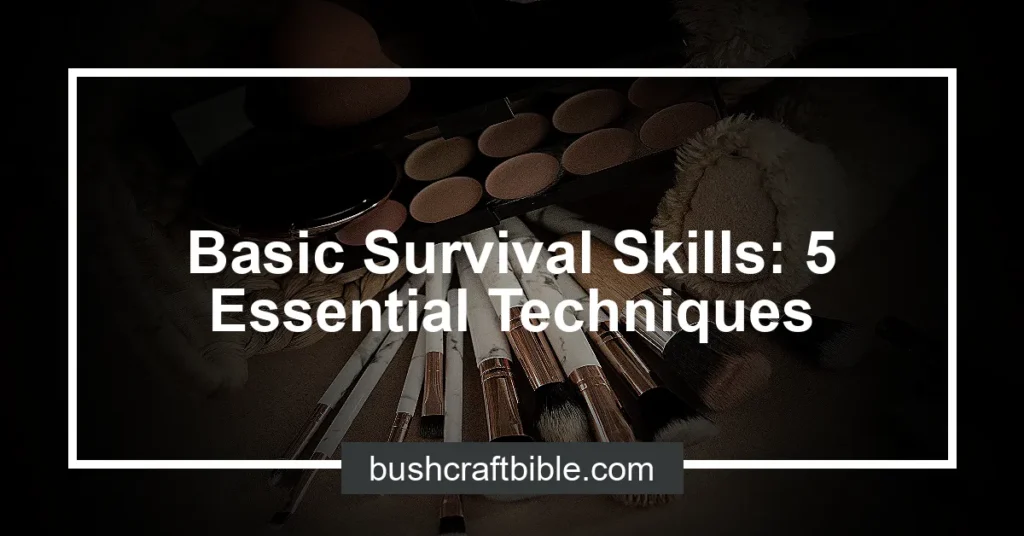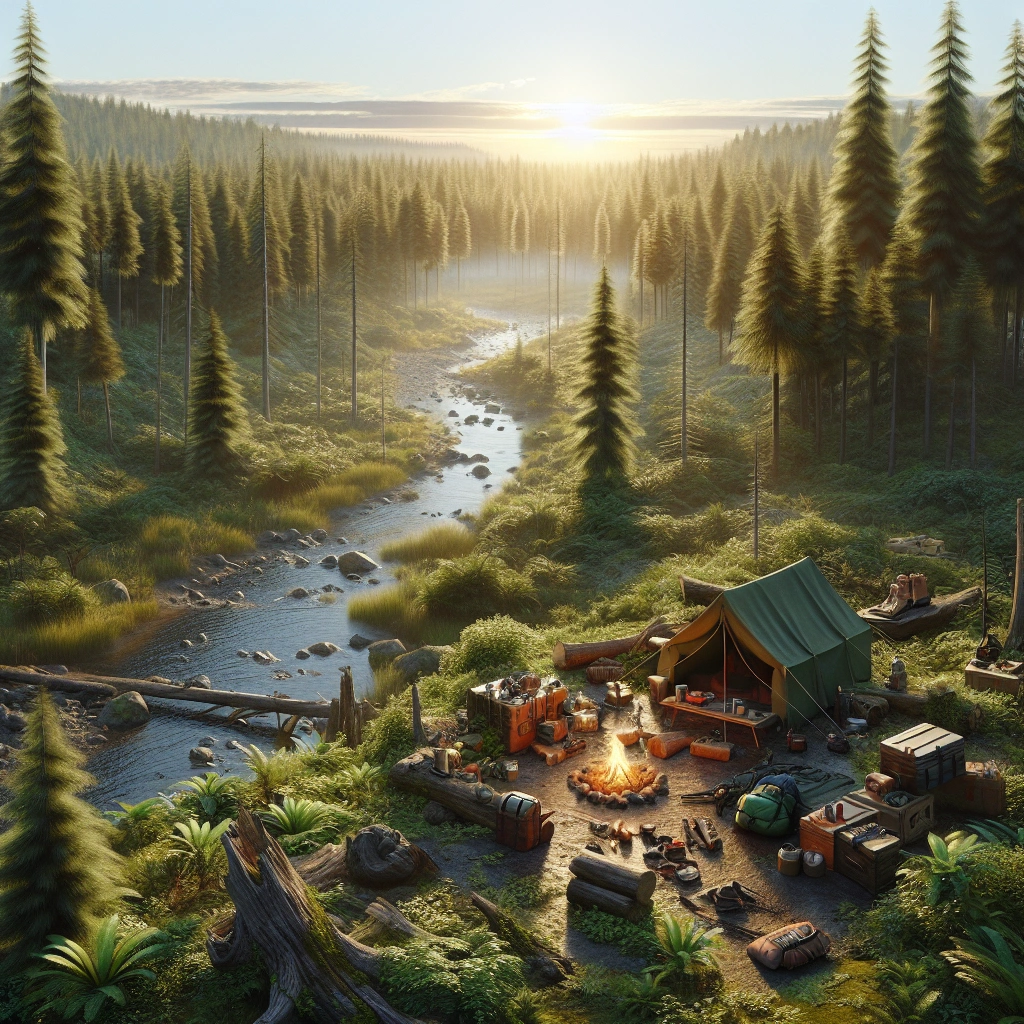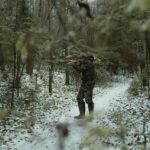

Basic Survival Skills are essential abilities that one should learn in order to increase their chances of survival in emergency situations. These skills include building a fire, creating potable water, tying knots, and other techniques that can be crucial for staying safe in the wilderness.
Learning Basic Survival Skills is important because it can mean the difference between life and death in an emergency. By acquiring these skills, individuals can increase their preparedness and ability to make sound decisions while staying calm in high-pressure situations.
Additionally, having knowledge of Basic Survival Skills can provide a sense of security and confidence when venturing into the outdoors or facing unexpected circumstances.
Check out this Youtube video to learn 10 beginner bushcraft and survival skills that could potentially save your life in an emergency situation!
Understanding Basic Survival Skills
Definition of basic survival skills
In the wild, basic survival skills encompass the knowledge and abilities necessary to endure and thrive in challenging environments. It encompasses building shelter, starting a fire, procuring food and drinkable water, foundational first-aid, and signaling for help.
These skills are essential for short-term and long-term safety, especially in unpredictable situations.
The importance of learning basic survival skills
Learning basic survival skills is crucial as it equips individuals with the ability to navigate emergencies effectively. Whether in urban or wilderness settings, these skills can be life-saving.
They provide a sense of confidence and preparedness, ensuring individuals are better equipped to handle unforeseen circumstances.
Benefits of mastering basic survival skills
Mastering basic survival skills offers numerous benefits, including enhanced emergency preparedness, self-reliance, and the ability to assist others in distress. It fosters a proactive approach to personal safety, encouraging individuals to take charge in challenging situations, thereby reducing the likelihood of panic and ensuring better outcomes.
| Benefits of Mastering Basic Survival Skills |
|---|
| 1. Enhanced emergency preparedness |
| 2. Self-reliance and confidence |
| 3. Ability to assist others in distress |
Building Shelter
Importance of shelter in survival situations
Shelter is crucial in survival situations as it provides protection from the elements, such as extreme weather conditions and temperature fluctuations. It helps in preserving body heat, preventing hypothermia, and maintaining overall well-being.
Additionally, shelters offer a sense of security and privacy, which is vital for mental and emotional stability during challenging times.
Techniques for building a basic shelter
When constructing a basic shelter, it’s essential to consider the surrounding environment and available resources. Techniques vary depending on the situation, but common methods include using natural materials such as branches, leaves, and debris to create simple yet effective structures like lean-tos, debris huts, or A-frame shelters.
Proper positioning of the shelter in relation to wind direction and exposure is also key for protection against the elements.
Materials needed for building a shelter
The materials required for building a shelter depend on the chosen construction technique. Commonly used natural resources include sturdy branches for support, foliage for insulation, and bark for weatherproofing.
Other useful items may include paracord or vines for lashing and securing components, as well as a tarp or emergency blanket for added protection if available.
| Materials | Function |
|---|---|
| Sturdy branches | Structural support |
| Foliage | Insulation and padding |
| Bark | Weatherproofing and additional insulation |
| Paracord/vines | Lashing and securing components |
| Tarp/blanket | Additional protection if available |
The effectiveness of the shelter ultimately relies on the ability to utilize the environment’s resources optimally, ensuring safety and comfort in survival scenarios.
Starting a Fire
Importance of fire in a survival situation
Fire is crucial in survival situations as it provides warmth, enables cooking, helps in drying clothes and wet wood, and can be used to signal for help. In addition, it serves as a deterrent for predators, thereby enhancing safety in the wilderness.
Techniques for starting a fire without matches or a lighter
Several techniques can be used to start a fire without matches or a lighter, including:
1. Flint and steel: This involves striking a piece of steel against flint to generate sparks.
2. Traditional Lenses: Using a magnifying glass or eyeglasses to focus sunlight onto tinder to ignite a fire.
3. Hand Drill: Rubbing a wooden stick against a wooden base to create friction and generate heat to ignite a fire.
Fire safety tips
To ensure fire safety in outdoor settings:
– Build campfires or cooking fires downwind and far from tents.
– Always have water nearby before starting a campfire.
– Never use flammable liquids like gasoline to start a fire.
– Supervise children around fires and never leave a fire unattended.
Procuring Food and Water
Importance of finding food and drinkable water in a survival situation
The importance of finding food and drinkable water in a survival situation cannot be overstated. Without access to these essentials, the human body quickly becomes vulnerable to dehydration, malnutrition, and overall physical deterioration.
In the wild, securing these resources is crucial for sustaining energy levels and maintaining overall health.
Techniques for procuring food in the wild
When it comes to procuring food in the wild, foraging for edible plants and fruits can be a reliable technique. Identifying edible plants and fruits is essential, and having knowledge about seasonal availability and safe consumption is imperative.
Additionally, setting up traps, such as snares, and learning basic hunting techniques can help in securing protein-rich food sources.
Techniques for finding and purifying water in the wild
Finding and purifying water in the wild is a vital skill for survival. Techniques such as locating natural water sources like rivers, streams, or dew collection points provide access to water.
However, ensuring its safety for consumption through purification methods such as boiling, chemical treatment, or the use of portable water filters helps prevent waterborne illnesses.
First-Aid Skills
Importance of basic first-aid skills in a survival situation
In a survival situation, basic first-aid skills are crucial as they can mean the difference between life and death. Being able to address injuries promptly can prevent complications and increase the chances of survival.
For example, knowing how to apply pressure to stop bleeding or stabilize a broken bone can be life-saving in the wilderness.
Essential first-aid techniques for treating common injuries in the wilderness
Some essential first-aid techniques for treating injuries in the wilderness include wound cleaning, bandaging, splinting, and recognizing the signs of dehydration and shock. Understanding how to assess and address these common injuries is vital for ensuring the well-being of oneself and others during outdoor activities.
Building a basic first-aid kit for outdoor activities
When venturing into the outdoors, it’s essential to have a well-equipped first-aid kit. This kit should include items such as bandages, antiseptic wipes, adhesive tape, pain relievers, tweezers, and basic medications.
Additionally, including items specific to outdoor activities, such as blister treatments and insect bite relief, can help address common outdoor-related injuries effectively.
Signaling for Help
Importance of signaling for help in a survival situation
Signaling for help is crucial in a survival situation as it increases the chances of rescue and survival. It allows individuals to attract attention from potential rescuers and communicates distress or emergency status effectively.
Techniques for signaling for help in the wilderness
Some effective techniques for signaling for help in the wilderness include creating large SOS signals on open grounds using rocks or logs, using a signaling mirror to reflect sunlight towards potential rescuers, and creating visible smoke signals from a bonfire or fire pit.
Tools and methods for signaling for help
Key tools and methods for signaling for help include using a whistle to produce a loud, distinct sound, carrying a personal locator beacon (PLB) for emergency distress signaling, and utilizing a signal mirror to reflect sunlight in the direction of aircraft or rescue teams.
Basic Survival Skills for Different Environments
Adapting basic survival skills for different environments (mountains, forests, deserts, etc.)
To adapt to different environments, it’s crucial to master versatile survival skills. In mountains, focus on navigation, shelter-building, and being prepared for rapid weather changes.
In forests, honing skills in foraging for edible plants, setting up traps for small game, and understanding the local wildlife is essential. For deserts, prioritizing water conservation, sun protection, and knowing how to find shade are vital.
Understanding the unique challenges of different environments and how to overcome them
Each environment presents its own set of challenges. Woods can be dense and disorienting, so learning to navigate using landmarks and basic tools is key.
Mountains can have severe weather and rapid temperature changes, so mastering the art of building weatherproof shelters is essential. In deserts, combating extreme heat, limited water sources, and potential encounters with dangerous wildlife demands specific skills and precautions.
Tips for surviving in specific environments
- Mountains:
- Dress in layers to prepare for rapid weather changes
- Learn basic rock climbing and rappelling techniques for steep terrains
- Carry a reliable compass and map for navigation
- Forests:
- Familiarize yourself with edible plants and local wildlife
- Master setting up snares and traps for small game
- Practice building shelters using available natural resources
- Deserts:
- Carry ample water and conserve it wisely
- Protect yourself from the sun with appropriate clothing and gear
- Seek shade during peak heat hours and avoid risky animal encounters
Survival Psychology
The importance of mindset in a survival situation
Maintaining a positive mindset is crucial in a survival scenario. It can often be the difference between success and failure.
Your mindset determines your ability to strategize, adapt, and overcome challenges, ultimately impacting your chances of survival. For example, believing in your ability to endure and overcome obstacles can significantly boost your resilience and determination.
Techniques for maintaining a positive mindset during a survival scenario
Engaging in positive self-talk, visualizing successful outcomes, and setting achievable short-term goals are effective techniques for nurturing a positive mindset during a survival scenario. By focusing on the present moment and acknowledging small victories, you can maintain a sense of control and optimism.
Additionally, practicing mindfulness and deep breathing exercises can help alleviate stress and keep your mindset focused and clear.
Coping strategies for dealing with fear, anxiety, and stress in a survival situation
Coping with fear, anxiety, and stress in a survival situation requires acknowledging and addressing these emotions. Utilizing techniques such as controlled breathing, grounding exercises, and mental distractions can help manage overwhelming emotions.
Developing a routine, seeking social support, and focusing on problem-solving can also aid in coping with the psychological impact of a survival scenario.
Basic Survival Skills for Different Scenarios
Applying basic survival skills in various emergency situations
When facing different emergency situations, it’s crucial to apply basic survival skills effectively. Prioritize tasks based on the immediate needs, such as medical assistance, before focusing on shelter and water.
Understanding the specific requirements of each scenario is essential for quick decision-making and efficient use of resources.
Strategies for survival during natural disasters, accidents, and other unexpected events
In the face of natural disasters or accidents, having a clear survival strategy is paramount. For natural disasters, seek secure locations and wait until it’s safe to assess the situation.
In accidents, providing immediate first aid and maintaining composure are vital components of a successful survival strategy. Practical knowledge and mental preparedness play a significant role in these scenarios.
Tips for preparation and quick thinking in emergency situations
Preparation and quick thinking are fundamental in emergency situations. Preparing emergency kits with essential supplies and equipment can significantly aid in coping with unexpected events.
Moreover, practicing quick decision-making through simulations and scenarios helps in honing the ability to think on one’s feet during emergencies.
Training and Preparation
The importance of training and preparedness for survival situations
Training and preparedness are paramount for survival situations. Being equipped with the necessary skills and knowledge enables individuals to navigate through challenging circumstances effectively. In times of crisis, the ability to remain level-headed and make informed decisions can directly impact personal safety and the well-being of others. Proper training and preparedness significantly minimize the human and financial toll of disasters, underscoring their vital role in safeguarding lives and assets.
Resources for learning and training in basic survival skills
Learning basic survival skills is invaluable and readily accessible through a variety of resources. Online platforms, wilderness training classes, and specialized courses offer comprehensive guidance on essential techniques such as fire building, water procurement, shelter construction, first aid, and more. Individuals can also explore educational materials, including books, videos, and seminars, to acquire fundamental survival knowledge and practical expertise. By leveraging these resources, one can gain the critical abilities needed to thrive in challenging environments.
Creating a survival plan and emergency kit
Creating a well-defined survival plan and assembling an emergency kit are fundamental components of proactive preparedness. Developing a detailed strategy tailored to specific scenarios lays the groundwork for effective decision-making during crises. Additionally, building an emergency kit comprising essential items, such as food, water, first aid supplies, communication tools, and protective gear, ensures readiness for unforeseen challenges. By establishing a comprehensive survival plan and a fully stocked emergency kit, individuals bolster their capacity to endure and overcome unexpected adversity.
| Blog Resources | |
|---|---|
| —————- | |
| Wilderness Survival Training & Techniques | |
| Basic Emergency Kit Checklist | Survival Skills Online Courses |
Teaching Basic Survival Skills
The importance of passing on basic survival skills to others
It is absolutely critical to pass on basic survival skills to others. In the wild, you never know what might happen, and having the ability to survive and thrive independently is invaluable.
It fosters a sense of self-reliance and preparedness, ensuring that individuals are not entirely dependent on external help, which can be especially crucial in emergency situations.
Techniques for teaching basic survival skills to children and beginners
Teaching basic survival skills to children and beginners involves hands-on demonstrations, interactive activities, and storytelling to engage and educate them effectively. It’s important to keep the learning process engaging and age-appropriate to maintain their interest.
Practical activities such as building shelters, identifying edible plants, and starting fires in a controlled environment can make the learning experience both informative and enjoyable.
Encouraging a culture of preparedness and self-reliance in the community
Creating a culture of preparedness and self-reliance in the community involves organizing workshops, community events, and classes focused on survival skills. Encouraging local involvement in initiatives such as community gardens, disaster preparedness drills, and volunteer programs fosters a sense of self-sufficiency and communal support.
By sharing knowledge and resources, the community can cultivate a mindset of readiness and resilience in the face of challenges.
| Key points to Remember |
|---|
| 1. Importance of Independence |
| 2. Hands-On Demonstrations |
| 3. Engaging Learning Activities |
| 4. Community Involvement |
| 5. Knowledge Sharing |
Remember, empowering individuals with basic survival skills not only equips them to face the wilderness but also instills a sense of confidence and capability.
Recommended Amazon Products for Basic Survival Skills
Here’s a curated list of products that can help you achieve basic survival skills with ease. These recommendations are based on functionality, durability, and customer reviews.
LifeStraw Personal Water Filter
The LifeStraw Personal Water Filter is a must-have for procuring drinkable water in the wild. With its compact design and ability to filter up to 1,000 gallons of contaminated water, it’s an essential tool for survival situations. Check it out on Amazon!


Gerber Bear Grylls Fire Starter
The Gerber Bear Grylls Fire Starter is a reliable tool for starting a fire without matches or a lighter. Its compact and waterproof design makes it a practical choice for outdoor and survival use. Check it out on Amazon!


TETON Sports Scout 3400 Internal Frame Backpack
The TETON Sports Scout 3400 Internal Frame Backpack is designed for carrying essential survival gear and supplies. It offers durability, comfort, and ample storage capacity for outdoor adventures. Check it out on Amazon!


Coleman Sundome Tent
The Coleman Sundome Tent is a reliable shelter option for outdoor enthusiasts and survival situations. With its easy setup and weather-resistant design, it provides a secure and comfortable shelter for the wilderness. Check it out on Amazon!


S. O. L. Survive Outdoors Longer Emergency Bivvy
The S. O. L. Survive Outdoors Longer Emergency Bivvy is an essential item for emergency shelter and protection from the elements. Its lightweight and compact design make it a practical addition to any survival kit. Check it out on Amazon!


Top Recommended Product for Basic Survival Skills
If you’re looking for the best solution for basic survival skills, we highly recommend the LifeStraw Personal Water Filter. Here’s why:
| Pros | Cons |
|---|---|
| Filters up to 1,000 gallons | Not suitable for purifying salt water |
| Compact and portable design | Requires sucking to operate |
| Durable and reliable | Replacement filters are sold separately |
Ready to improve your basic survival skills? Check out the LifeStraw Personal Water Filter today for the best results!


Conclusion
Basic survival skills are essential for anyone to have, as they can be the difference between life and death in a crisis situation. By learning and practicing these skills, individuals can be better prepared to handle unexpected emergencies and disasters.
This can include knowing how to find and purify water, build a shelter, and start a fire.
Having a basic understanding of first aid and medical care is also crucial for survival, as injuries and illnesses can occur at any time. Being able to administer first aid and treat common ailments can greatly increase the chances of survival in a wilderness or disaster scenario.
Additionally, being familiar with navigation techniques and being able to signal for help can greatly increase the likelihood of being rescued in a crisis situation.
Basic survival skills provide individuals with the knowledge and confidence to handle a wide range of emergency situations. By being prepared and knowledgeable, individuals can greatly increase their chances of surviving and thriving in challenging and unexpected circumstances.
It is important for everyone to take the time to learn and practice these skills, as they can make a significant difference in a crisis.
Frequently Asked Questions
What are the 5 basic survival skills?
What are the 5 important things for survival?
What do you need for basic survival?
What is most important for survival?
What are the 5 essential survival skills?
Reference Links
- https://reviewed.usatoday.com/home-outdoors/features/your-emergency-response-guide-how-prepare-any-situation
- https://www.quora.com/Where-can-one-live-in-a-forest-What-sort-of-survival-skills-would-be-necessary
- https://www.reddit.com/r/Survival/comments/aq0k0b/im_trying_to_learn_wilderness_survival_where/










